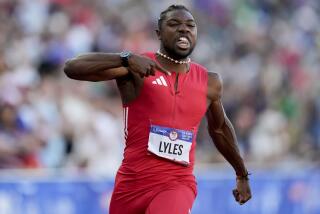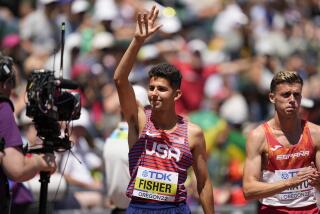Support on the Cinders : New Home Has Helped Whiteley Enjoy Running Again
In June of 1989, Greg Whiteley left Brown University in Providence, R.I., determined to see the world and, at the same time, find his place in it.
Whiteley had good reason to think the globe could be his for the taking. He was 22, with an Ivy League degree in economics and five NCAA All-American honors in track and field and cross-country.
First, the compass pointed to Europe.
He spent nearly a year based in Denmark and other cities--London, Oslo, Stockholm--running international track meets. He raced against the best distance runners in the world--Said Aouita, Steve Ovett, John Walker and Dave Moorcroft.
It was thrilling, but something was amiss.
Next stop was Providence, then Ann Arbor, Mich., then San Francisco.
“I was just floating around,” said Whiteley, 24, a standout at University High School in 1985 and the last Orange County prep runner to break 9 minutes for 3,200 meters.
He spent eight months in San Francisco, overcoming what he called “the post-collegiate blues” and thinking about what he was really going to do with his life. The more he thought about it, the more he realized the compass pointed north.
World-class distance runners might not be tripping over each other the way they once were on the wood chip trails of Alton Baker Park in Eugene, Ore., but it’s still a slice of heaven. Eugene is just the sort of place Whiteley could drop his bags for a lengthy stay, train for next year’s Olympic Trials and consider a career outside running.
So what if he landed in neighboring Springfield? The last month has been good to Whiteley.
He has run three races--a mile in 3:59, 1,500 meters in 3:42 and 5,000 in 13:37--as fast as he ever ran at Brown. He has found a good coach in Mike Manley, a five-time Olympic Trials 3,000-meter steeplechase qualifier.
He has applied to the University of Oregon’s law school and, in the meantime, he’s working with troubled teens at local high schools.
Finally, he feels comfortable. There is a support system in Eugene where there was none at Whiteley’s previous stops.
Seeing his picture in the Eugene Register-Guard the day after the sub four-minute mile helped him feel at home. So did the crowd of 3,833 who watched the Oregon Twilight meet at Hayward Field and instantly took Whiteley into its embrace.
“I found myself questioning why I wanted to run,” Whiteley said. “That created a host of other issues. It distracted me. For people who are graduated, who want to keep running, there has to be a support system. Athletes to train with are the most important ingredient.”
Those competitive feelings have begun to return. Last week, Dan Nelson, a former Oregon runner who also trains with Manley, pushed Whiteley to his 13:37 in the 5,000.
It was a pleasing time, but Whiteley was out-kicked by Nelson on the final lap, which has fanned the fires further.
“I don’t think I gave everything I could in that last lap,” Whiteley said.
Sunday, he’ll be racing 5,000 meters again, but this time he’s running a road race in Newport Beach, The Newport 5K.
He’s back home, where he first showed his potential. As a senior in 1985, he had bests of 4:13 for the 1,600 and 8:57 for 3,200.
Amazingly enough, Whiteley rarely ran more than 35 miles a week, following a patience-is-virtue theme stressed by Coach Frank Duarte.
Going into the Southern Section championships, he was considered one of the favorites in the State meet at Sacramento.
But he never made it to the section meet. A throat virus that week left Whiteley with a 102-degree temperature and reduced his chances of getting out of bed, much less running, to next to nil.
Still, he rebounded. Brown Coach Dan Challener wanted Whiteley to run for the Bears. Whiteley jumped at the chance.
At Brown, he thrived under similar training--seldom running more than 60 miles a week--and his times dropped further.
He advanced to the 1988 Olympic Trials in the 5,000, placed third in the NCAA 5,000 and, as a senior in 1989, ran the 10,000 in 28:45.
But then he graduated and, though he didn’t realize it at first, he lost much of his direction. Suddenly, he didn’t have a 2 p.m. workout every day. He didn’t have a coach. He didn’t have a job.
His running suffered as he bounced from city to city. He left Providence to find himself, but instead, he seemed to be lost.
After two years, Whiteley is finally settling into a groove in Oregon. He’s pointing for The Athletics Congress championships June 12-15 and, of course, the Olympic Trials next year. He has become more serious in his training, and it appears he’s as fast as ever.
Better still, he has found a place to call home.
“It really hasn’t been,” he said, “until I came up here and finally said, ‘OK, this is cool.’ ”
More to Read
Go beyond the scoreboard
Get the latest on L.A.'s teams in the daily Sports Report newsletter.
You may occasionally receive promotional content from the Los Angeles Times.










